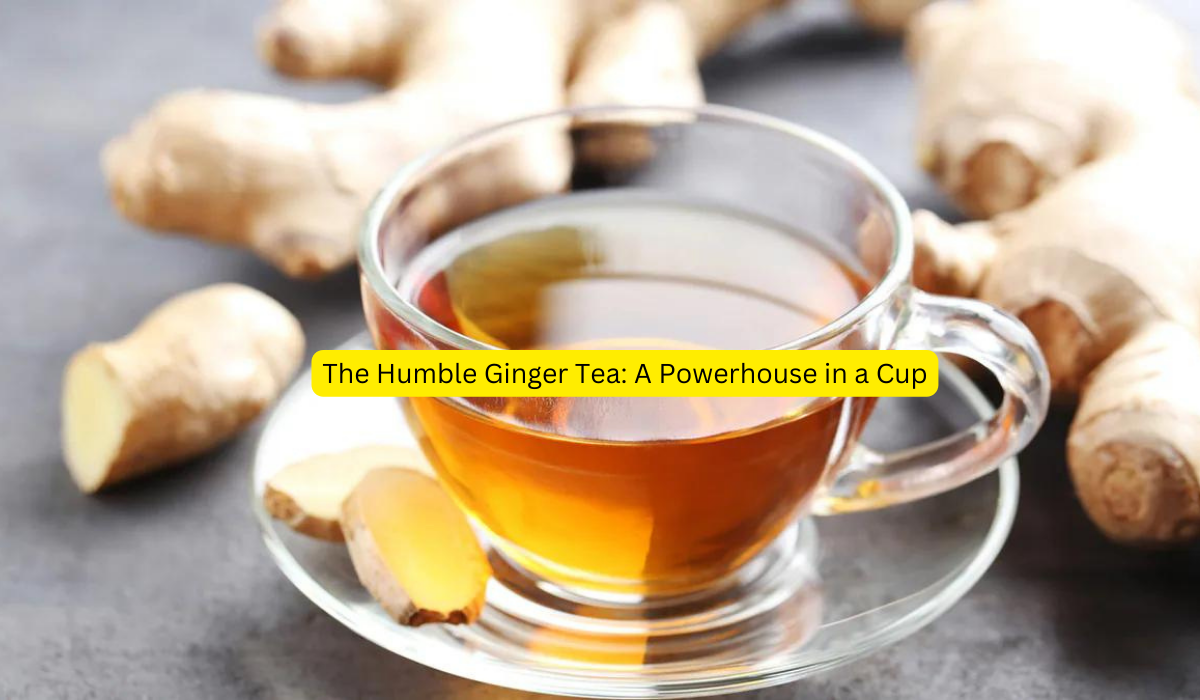Ginger tea. It’s more than just a grandma’s remedy for a queasy stomach. This simple brew, made from the knobby root of the ginger plant, boasts a treasure trove of potential health benefits. From soothing your digestion to giving your immune system a boost, ginger tea is a versatile and delicious addition to your wellness routine. Let’s delve into the world of ginger tea, exploring its unique properties and the reasons why it deserves a permanent spot on your kitchen counter.
A Spicy Kick for Your Digestion: Ginger Tea to the Rescue
Feeling bloated or experiencing occasional heartburn? Ginger tea might be your new best friend. Here’s how it can tame digestive woes:
- Natural Digestive Aid: Ginger contains gingerol, a potent compound that helps stimulate the production of digestive enzymes. These enzymes break down food more efficiently, promoting smoother digestion and reducing discomfort.
- Soothes Nausea: The calming properties of ginger can help settle a queasy stomach. Whether it’s motion sickness, morning sickness, or just a case of indigestion, ginger tea can offer some natural relief.
The Takeaway: From calming an upset stomach to promoting healthy digestion, ginger tea can be a soothing and effective ally for your digestive system.
Beyond Digestion: Unveiling the Potential Health Benefits of Ginger Tea
Ginger tea’s benefits extend far beyond calming your gut. Here’s a glimpse into its potential:
- Anti-inflammatory Powerhouse: Gingerol, the same compound that aids digestion, also possesses anti-inflammatory properties. This can be helpful in managing conditions like arthritis or muscle soreness.
- Immune System Booster: Ginger is packed with antioxidants, which help fight free radicals that can damage cells and contribute to various health issues. A healthy immune system starts with a strong defense against these free radicals, and ginger tea can be a helpful addition to your immune-supporting arsenal.
- Potential Pain Reliever: Studies suggest that ginger might offer pain relief for menstrual cramps and even headaches.
Remember: While these benefits are promising, consult your doctor to discuss if ginger tea is suitable for your specific needs and potential interactions with medications.
Warm Comfort for a Cold: Ginger Tea to the Rescue
Feeling under the weather? Ginger tea can be a comforting ally:
- Soothing Sore Throat: The warm liquid and the mild anti-inflammatory properties of ginger can help soothe a scratchy throat and ease the discomfort associated with a cold.
- Promotes Sweating: A warm cup of ginger tea can induce mild sweating, which can be helpful for lowering a fever and promoting overall comfort.
The Bonus: Whether you’re battling a cold or simply seeking a warm and comforting beverage, ginger tea can be a soothing and potentially helpful addition to your self-care routine.
Aromatic Delight: Brewing the Perfect Cup of Ginger Tea
Making ginger tea is as simple as it gets. Here’s your guide to brewing a perfect cup:
- Fresh vs. Dried Ginger: Both fresh and dried ginger work well. Fresh ginger offers a more intense flavor, while dried ginger is convenient for storage.
- The Art of Simmering: Gently simmer ginger slices or grated ginger root in hot water for 5-10 minutes. This allows the beneficial compounds to be released into the water.
- Flavor Twists: Enhance your ginger tea with a squeeze of lemon or honey for added flavor and potential health benefits.
The Key: Experiment and find the brewing method and flavor combinations that suit your taste preferences.
The Verdict: Ginger Tea – A Simple Remedy with a Multitude of Benefits
Ginger tea is more than just a comforting beverage. It’s a simple and delicious way to potentially boost your digestion, support your immune system, and even offer relief from various ailments. Remember, moderation is key. While ginger tea is generally safe, excessive consumption can irritate your stomach.
5 FAQs: Steeping the Truth About Ginger Tea
1. Does ginger tea interact with any medications?
Ginger can interact with certain medications, particularly blood thinners and blood sugar medications. Always consult your doctor before starting ginger tea, especially if you’re taking any medications, to ensure it’s safe for you and avoid potential interactions.
2. Can children drink ginger tea?
Ginger tea is generally safe for children in moderate amounts. However, due to its spiciness, it’s best to dilute it with water or add honey for sweetness to make it more palatable for younger children. Always supervise children when they consume hot beverages like ginger tea.
3. Are there different types of ginger tea available?
Yes! You can find various types of ginger tea commercially, often blended with other herbs like lemongrass, peppermint, or chamomile. These blends can offer additional health benefits depending on the specific herbs used. Experiment and find a flavor combination you enjoy.
4. Can I use ginger tea as a topical remedy?
While ginger tea is primarily consumed as a beverage, some people use a cooled, concentrated ginger tea solution as a topical compress for muscle aches or joint pain. The anti-inflammatory properties of ginger might offer some localized relief. However, more research is needed to confirm its effectiveness for topical use. Consult your doctor before using ginger tea topically, especially for open wounds or irritated skin.
5. Can I use ginger tea to freshen my breath?
The refreshing and slightly spicy nature of ginger tea can help mask bad breath temporarily. However, it won’t address the underlying cause of bad breath. Maintain good oral hygiene practices like brushing and flossing regularly for long-lasting fresh breath.

